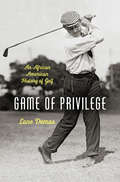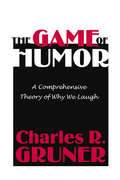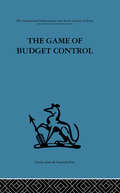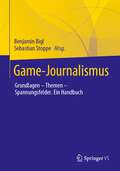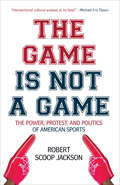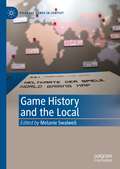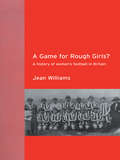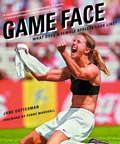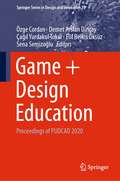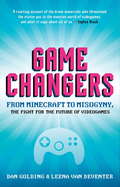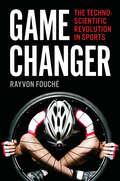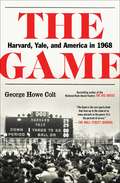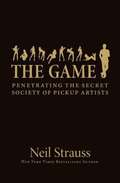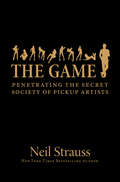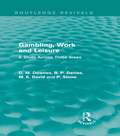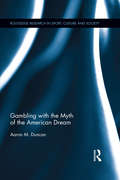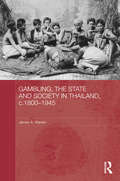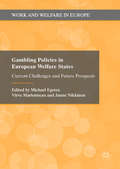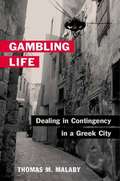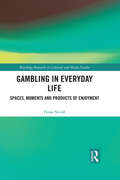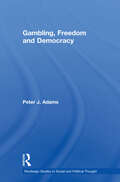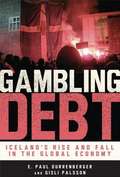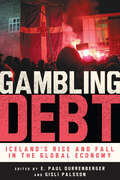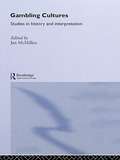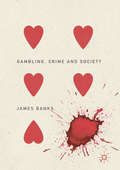- Table View
- List View
Game of Privilege: An African American History of Golf (The John Hope Franklin Series in African American History and Culture)
by Lane DemasThis groundbreaking history of African Americans and golf explores the role of race, class, and public space in golf course development, the stories of individual black golfers during the age of segregation, the legal battle to integrate public golf courses, and the little-known history of the United Golfers Association (UGA)--a black golf tour that operated from 1925 to 1975. Lane Demas charts how African Americans nationwide organized social campaigns, filed lawsuits, and went to jail in order to desegregate courses; he also provides dramatic stories of golfers who boldly confronted wider segregation more broadly in their local communities. As national civil rights organizations debated golf’s symbolism and whether or not to pursue the game’s integration, black players and caddies took matters into their own hands and helped shape its subculture, while UGA participants forged one of the most durable black sporting organizations in American history as they fought to join the white Professional Golfers’ Association (PGA). From George F. Grant’s invention of the golf tee in 1899 to the dominance of superstar Tiger Woods in the 1990s, this revelatory and comprehensive work challenges stereotypes and indeed the fundamental story of race and golf in American culture.
The Game of Humor: A Comprehensive Theory of Why We Laugh
by Charles R. GrunerHumor, wit, and laughter surround each person. From everyday quips to the carefully contrived comedy of literature, newspapers, and television we experience humor in many forms, yet the impetus for our laughter is far from innocuous. Misfortune, stupidity, and moral or cultural defects, however faintly revealed in others and ourselves, seem to make us laugh. Although discomforting, such negative terms as superiority, aggression, hostility, ridicule, or degradation can be applied to instances of humor. According to scholars, Thomas Hobbes's "superiority theory" that humor arises from mischances, infirmities, and indecencies, where there is no wit at all applies to most humor. With the exception of good-natured play, Charles R. Gruner claims that humor is rarely as innocent as it first appears.Gruner's proposed superiority theory of humor is all-encompassing. In The Game of Humor, he expands the scope of Hobbes's theory to include and explore the contest aspect of "good-natured" play. As such, the author believes all instances of humor can be examined as games, in terms of competition and keeping score winners and losers. Gruner draws on a broad spectrum of thought-provoking examples. Holocaust jokes, sexual humor, the racialist dialogue of such comic characters as Stepin Fetchit and Archie Bunker, simple puns, and many of the author's own encounters with everyday humor. Gruner challenges the reader to offer a single example of humor that cannot be "de-humorized" by its agonistic nature.The Game of Humor makes intriguing and enjoyable reading for people interested in humor and the aspects of human motivation. This book will also be valuable to professionals in communication and information studies, sociologists, literary critics and linguists, and psychologists concerned with the conflicts and tensions of everyday life.
The Game of Budget Control
by G H HofstedeTavistock Press was established as a co-operative venture between the Tavistock Institute and Routledge & Kegan Paul (RKP) in the 1950s to produce a series of major contributions across the social sciences. This volume is part of a 2001 reissue of a selection of those important works which have since gone out of print, or are difficult to locate. Published by Routledge, 112 volumes in total are being brought together under the name The International Behavioural and Social Sciences Library: Classics from the Tavistock Press. Reproduced here in facsimile, this volume was originally published in 1968 and is available individually. The collection is also available in a number of themed mini-sets of between 5 and 13 volumes, or as a complete collection.
Game-Journalismus: Grundlagen – Themen – Spannungsfelder. Ein Handbuch
by Benjamin Bigl Sebastian StoppeDas Handbuch „Game-Journalismus“ bespricht erstmalig im deutschsprachigen Raum ein wenig beachtetes journalistisches Berufsfeld. Es führt kompakt in die Grundlagen des Game-Journalismus sowie dessen Entwicklung und Ausdifferenzierung ein und bespricht Trends und Herausforderungen für Journalismus, Spielerinnen und Spieler. Der Band zeigt die Vielfalt des Berufsfelds in den unterschiedlichen Mediengattungen und -formen, denn Games haben nicht nur einen festen Platz in der Kultur-, Wissenschafts- und Technikberichterstattung. Games und Phänomene der Computerspielekultur werden zunehmend auch in Online-Magazinen, professionellen und privaten Blogs, Podcasts und Video-Kanälen behandelt. Laien machen als Game-Influencer den etablierten Berufsfeldern Konkurrenz. Ausführlich werden Spannungsfelder reflektiert, mit denen Game-Journalisten konfrontiert werden und in denen sie agieren. Zudem werden aktuelle Befunde, Anforderungen des Jugendschutzes und des Urheberrechts, Monetarisierungsstrategien, die Veränderungen der Medienlandschaft sowie neue Vermittler und deren kreative Nutzerprodukte dargestellt und Vorschläge für die Aus- und Weiterbildung vom Game-Journalisten unterbreitet. Das Buch bietet sowohl wissenschaftliche als auch praktische Perspektiven auf eine vielfältige Publikationslandschaft und ist als ein Beitrag zur Erforschung des Game-Journalismus konzipiert.
The Game is Not a Game: The Power, Protest, and Politics of American Sports
by Robert Scoop JacksonA study of &“the hypocrisy of the game, capitalism, activism (a la Kaepernick), disrespect to female athletes, and who benefits from sports the most&” (Electric Lit). Part play-by-play, part op-ed, The Game Is Not a Game is an illuminating and unflinching examination of the good and evil in the sports industry. Liberating and provocative, with sharp wit and generous humor, Jackson&’s essays explore the role that sports plays in American society and the hypocritical standards by which the athletes are often judged. The Game Is Not a Game is distinctly intended to challenge accepted ideology and to push the boundaries of mainstream sports media beyond the comfort zone. Chapters expose &“Our Miseducation of LeBron James,&” &“#ThemToo: The UnRespected Worth of the Woman Athlete,&” the duplicity of the NFL in its treatment of Colin Kaepernick and the anthem protests, the cultural bias of analytics, and the power of social activism versus the power and politics of professional sports ownership—all from the sharp, savvy, and self-critical perspective of one of the leading voices for social justice in sports media. &“Bristles with bracing and brutal insights that take no tea for the fever and offer no discount on truth or justice . . . an instant classic that reckons with the factors that make sports possible, and at the same time wrestles with the forces that make protest in sports necessary. The Game Is Not a Game is intersectional cultural analysis at its best!&” —Michael Eric Dyson, New York Times bestselling author &“Jackson&’s work is not about scores; rather, he stresses that sports are a self-contained microcosm of society at large. A thought-provoking, unfailingly insightful book.&” —Booklist
Game History and the Local (Palgrave Games in Context)
by Melanie SwalwellThis book brings together essays on game history and historiography that reflect on the significance of locality. Game history did not unfold uniformly and the particularities of space and place matter, yet most digital game and software histories are silent with respect to geography. Topics covered include: hyper-local games; temporal anomalies in platform arrival and obsolescence; national videogame workforces; player memories of the places of gameplay; comparative reception studies of a platform; the erasure of cultural markers; the localization of games; and perspectives on the future development of ‘local’ game history.Chapters 1 and 12 are available open access under a Creative Commons Attribution 4.0 International License via link.springer.com.
A Game for Rough Girls?: A History of Women's Football in Britain
by Jean WilliamsCan we truly call football England's 'national' game?How have we arrived at this point of such clear inequality between men's and women's football? Between 1921 and 1972, women were banned from playing in football League grounds in the UK. Yet in 1998 FIFA declared that "the future is feminine" and that football was the fastest growing sport for women globally. The result of several years of original research, the book traces the continuities in women's participation since the beginnings of the game, and highlights the significant moments that have influenced current practice. The text provides: *insight into the communities and individual experiences of players, fans, investors, administrators and coaches*examination of the attitudes and role of national and international associations*analysis of the development of the professional game*comparisons with women's football in mainland Europe, the USA and Africa. A Game for Rough Girls is the first text to properly theorize the development of the game. Examining recreational and elite levels, the author provides a thorough critique, placing women's experience in the context of broader cultural and sports studies debates on social change, gender, power and global economics.
Game Face: What Does a Female Athlete Look Like?
by Jane GottesmanThe extraordinary collection of photographs and rich personal stories that make upGame Facedocuments the tremendous impact that sports has on the daily lives of millions of girls and women. On playing fields and street corners, in backyards and gyms, the people in this arresting array of pictures are unselfconsciously exploring the physical and emotional pleasures of competition and play. Each image offers an affirming and satisfying answer to the question at the heart ofGame Face: What do girls and women look like, freed from traditional feminine constraints, using their bodies in joyful and empowering ways? When Title IX was passed in 1972, only one out of twenty-seven school-age girls played sports. Now one in three does. Yet their expanding involvement in sports is still largely overlooked by the media, and as a consequence, millions of young female athletes crave not only role models but an authentic and appealing reflection of their own athleticism. As a young sports journalist, Jane Gottesman was all too aware of this imbalance, and saw the need for a book that honors both our top female athletes and the everyday girls and women whose self-image is strengthened through athletic participation. With the goal of showing America what women's sports looks like, she searched through the work of our country's best photographers, from the newest photojournalists to artists such as Annie Leibovitz and Ansel Adams. The result isGame Face, a unique and inspiring selection of color and black-and-white photographs, a text with first-person accounts by athletes, and an illustrated time line of women's athletic milestones. Published simultaneously with the opening of an important exhibition at the Smithsonian Institution that will tour for five years,Game Facehas been endorsed by the Girl Scouts of the USA, who've developed aGame Facepatch, the NCAA, and the YWCA of the USA. An inspiring gift for an athlete of any age, this powerful, timely book takes one of art's most studied subjects the female body and celebrates it in a brand-new way.
Game + Design Education: Proceedings of PUDCAD 2020 (Springer Series in Design and Innovation #13)
by Özge Cordan Demet Arslan Dinçay Çağıl Yurdakul Toker Elif Belkıs Öksüz Sena SemizoğluThis book gathers the papers of the PUDCAD Universal Design Practice Conference: Game + Design Education, organized by Istanbul Technical University and held online on June 24-26, 2020. The conference represented one of the key events of the Practicing Universal Design Principles in Design Education through a CAD-Based Game (PUDCAD) project, which developed a design game on a CAD-based platform, enabling students and designers to learn about universal design principles and develop accessible and innovative design ideas. As such, the PUDCAD project met one of the foremost goals of the European Commission, making sure the inclusion and efficient accessibility for people with disabilities into everyday life. The main topics of the conference include: universal design and education, universal design and user experience, game and design studies, gamification, virtual reality experiment, e-learning in design, and playful spaces and interfaces. The contributions, which were selected by means of a rigorous international peer-review process, highlight numerous exciting ideas that will spur novel research directions and foster multidisciplinary collaboration among different specialists.
Game Changers: From Minecraft To Misogyny: The Fight For The Future Of Videogames
by Dan Golding Leena Van DeventerThe videogame scene has evolved from the hobby of boys in bedrooms to a popular pastime for anyone with a smartphone. Many of the old guard resent this mainstreaming of games culture -- and they've been anything but welcoming. These trolls have created a climate of fear by abusing and harassing women, minorities and anyone who has dared to speak out against misogyny and other problems in the boys' club industry. Game Changers puts these conflicts under the microscope, in Australia and overseas. The book features exclusive interviews with many key figures working to make the videogame world a safe space, including Anita Sarkeesian and Zoë Quinn, two of the women at the centre of the Gamergate abuse. In 2015, they were asked by the United Nations to lead a panel discussion on the 'rising tide of online violence against women and girls'. Authors Dan Golding and Leena van Deventer use their extensive experience in the videogame industry, both as players and professionals, to examine how games culture is growing, diversifying and changing for the better.
Game Changer: The Technoscientific Revolution in Sports
by Rayvon FouchéHow has technology challenged the notion of unadulterated athletic performance?We like to think of sports as elemental: strong bodies trained to overcome height, weight, distance; the thrill of earned victory or the agony of defeat in a contest decided on a level playing field. But in Game Changer, Rayvon Fouché argues that sports have been radically shaped by an explosion of scientific and technological advances in materials, training, nutrition, and medicine dedicated to making athletes stronger and faster. Technoscience, as Fouché dubs it, increasingly gives the edge (however slight) to the athlete with the latest gear, the most advanced training equipment, or the performance-enhancing drugs that are hardest to detect. In this revealing book, Fouché examines a variety of sports paraphernalia and enhancements, from fast suits, athletic shoes, and racing bicycles to basketballs and prosthetic limbs. He also takes a hard look at gender verification testing, direct drug testing, and the athlete biological passport in an attempt to understand the evolving place of technoscience across sport. In this book, Fouché: • Examines the relationship among sport, science, and technology• Considers what is at stake in defining sporting culture by its scientific knowledge and technology• Provides readers and students with an informative and engagingly written studyFocusing on well-known athletes, including Michael Phelps, Oscar Pistorius, Caster Semenya, Usain Bolt, and Lance Armstrong, Fouché argues that technoscience calls into question the integrity of games, records, and our bodies themselves. He also touches on attempts by sporting communities to regulate the use of technology, from elite soccer's initial reluctance to utilize goal-line technology to automobile racing's endless tweaking of regulatory formulas in an attempt to blur engineering potency and reclaim driver skill and ability. Game Changer will change the way you look at sports—and the outsized impact technoscience has on them.
The Game: Harvard, Yale, and America in 1968
by George Howe ColtFrom the author of the bestselling National Book Award finalist The Big House comes a story in the tradition of The Boys in the Boat about an unforgettable group of young athletes who battled in the legendary Harvard-Yale football game of 1968 amidst the sweeping currents of one of the most transformative years in American history.On November 23, 1968, near the end of a turbulent and memorable year, there was a football game that would also prove turbulent and memorable: the season-ending clash between Harvard and Yale. Both teams entered undefeated and, technically at least, came out undefeated. The final score was 29-29. To some of the players on the field, it was a triumph; to others a tragedy. And to many, the reasons had as much to do with one side’s miraculous comeback in the game’s final 42 seconds as it did with the months that preceded it, months that witnessed the assassinations of Martin Luther King and Robert F. Kennedy, police brutality at the Democratic National Convention, inner-city riots, campus takeovers, and, looming over everything, the war in Vietnam. George Howe Colt’s The Game is the story of that iconic American year, as seen through the young men who lived it and were changed by it. One player had recently returned from eight months under fire in Vietnam. Two were members of the radical antiwar group SDS. There was an all-American football hero whose nickname was “God.” There was one NFL prospect who quit to devote his time to black altruism, another who went on to be Pro-Bowler Calvin Hill. There was a postal clerk’s son who worried about fitting in with the preppies, and a wealthy WASP eager to prove he could handle the blue-collar kids’ hits. There was a guard named Tommy Lee Jones, and fullback who dated a young Meryl Streep. They came from every class and background, but played side by side and together forged a moment of startling grace in the midst of the storm. Vivid, lively, and constantly surprising, this magnificent and intimate work of history is the story of ordinary people in an extraordinary time, and of a country facing issues that we continue to wrestle with to this day.
The Game: Penetrating the Secret Society of Pickup Artists
by Neil StraussThe author, a writer for Rolling Stone magazine, spent 2 years learning about and perfecting his 'game' - picking up women.
The Game: Penetrating the Secret Society of Pickup Artists
by Neil StraussHidden somewhere, in nearly every major city in the world, is an underground seduction lair. And in these lairs, men trade the most devastatingly effective techniques ever invented to charm women. This is not fiction. These men really exist. <P><P>They live together in houses known as Projects. And Neil Strauss, the bestselling author and journalist, spent two years living among them, using the pseudonym Style to protect his real-life identity. The result is one of the most explosive and controversial books of the last decade--guaranteed to change the lives of men and transform the way women understand the opposite sex forever.On his journey from AFC (average frustrated chump) to PUA (pick-up artist) to PUG (pick-up guru), Strauss not only shares scores of original seduction techniques but also has unforgettable encounters with the likes of Tom Cruise, Britney Spears, Paris Hilton, Heidi Fleiss, and Courtney Love. And then things really start to get strange--and passions lead to betrayals lead to violence. The Game is the story of one man's transformation from frog to prince to prisoner in the most unforgettable book of this generation.
Gambling, Work and Leisure: A Study Across Three Areas (Routledge Revivals)
by David Downes D. M. Davies M. E. David P. StoneSince the legalisation of off-course cash betting in 1960, and the rise of varying forms of gambling, the British have come to be known as a nation of gamblers. Until this study was published in 1976, barely any evidence existed against which to assess the claim that gambling had become a major social problem. The authors present data drawn from area surveys carried out in Swansea, Sheffield, Wanstead and Woodford, and explore how well previous sociological theories of gambling agree with their findings, particular in connection with certain aspects of work and leisure. Examining different forms of gambling, including betting, bingo and gaming machines, the chapters consider how gambling choices vary between different social groups, and how much time and money is spent on them. With the internet making it easier than ever before to place bets, this title is especially relevant, and provides a systematic basis for an explanation of gambling in relation to social structure.
Gambling with the Myth of the American Dream (Routledge Research in Sport, Culture and Society #44)
by Aaron M. DuncanThis book explores the rise and increased acceptance of gambling in America, particularly the growth of the game of poker, as a means for examining changes to the American Dream and the risk society. Poker both critiques and reinterprets the myth of the American Dream, putting greater emphasis on the importance of luck and risk management while deemphasizing the importance of honesty and hard work. Duncan discusses the history of gambling in America, changes to the rhetoric surrounding gambling, the depiction of poker in the Wild West as portrayed in film, its recent rise in popularity on television, its current place in post-modern America on the internet, and future implications.
Gambling, the State and Society in Thailand, c.1800-1945 (Routledge Studies in the Modern History of Asia)
by James A. WarrenDuring the nineteenth century there was a huge increase in the level and types of gambling in Thailand. Taxes on gambling became a major source of state revenue, with the government establishing state-run lotteries and casinos in the first half of the twentieth century. Nevertheless, over the same period, a strong anti-gambling discourse emerged within the Thai elite, which sought to regulate gambling through a series of increasingly restrictive and punitive laws. By the mid-twentieth century, most forms of gambling had been made illegal, a situation that persists until today. This historical study, based on a wide variety of Thai- and English-language archival sources including government reports, legal cases and newspapers, places the criminalization of gambling in Thailand in the broader context of the country’s socio-economic transformation and the modernization of the Thai state. Particular attention is paid to how state institutions, such as the police and judiciary, and different sections of Thai society shaped and subverted the law to advance their own interests. Finally, the book compares the Thai government’s policies on gambling with those on opium use and prostitution, placing the latter in the context of an international clampdown on vice in the early twentieth century.
Gambling Policies in European Welfare States: Current Challenges and Future Prospects (Work and Welfare in Europe)
by Michael Egerer Virve Marionneau Janne NikkinenThis edited book draws on a cross-cultural and historical lens to theoretically and practically analyse gambling regulations and the use of gambling revenue. It takes on a broad spectrum of perspectives, from the origin of the money, to the regulators, operators and beneficiaries of gambling, and looks at the interests, networks and power relations involved.This multidisciplinary collection elicits a shift in analysis, shedding light on a broader societal, historical and economic view of gambling and gambling policies, by its attention to implicit networks of power, influential legislation, gambling provision and infrastructure.Gambling Policies in European Welfare States will be of interest to students and scholars alike who are seeking cross-national and interdisciplinary analyses of welfare, politics, sociology and economics.
Gambling Life: DEALING IN CONTINGENCY IN A GREEK CITY
by Thomas M. MalabyThe only ethnography devoted to the practice of gambling as its core subject, Gambling Life considers the stakes of social action in one community on the island of Crete. Backgammon cafés, card clubs, and hidden gambling rooms in the city of Chania provide the context for Thomas M. Malaby to examine the ways in which people confront uncertainty in their lives. He shows how the dynamics of gambling -- risk, fate, uncertainty, and luck -- are reflected in other aspects of gamblers' lives from courtship and mortality to state bureaucracy and national identity. By moving beyond risk and fate as unexamined analytical categories, Malaby presents a new model for research concerning indeterminacy, seeing it as arising from stochastic, performative, and other sources. Gambling Life questions the longstanding valorization of order and pattern in the social sciences.
Gambling in Everyday Life: Spaces, Moments and Products of Enjoyment (Routledge Research in Cultural and Media Studies)
by Fiona Jean NicollThe book adopts a critical cultural studies lens to explore the entanglement of government and gambling in everyday life. Its qualitative approach to gambling creates a new theoretical framework for understanding the most urgent questions raised by research and policy on gambling. In the past two decades, gambling industries have experienced exponential growth with annual global expenditure worth approximately 300 billion dollars. Yet most academic research on gambling is concentrated on problem gambling and conducted within the psychological sciences. Nicoll considers gambling at a moment when its integration within everyday cultural spaces, moments, and products is unprecedented. This is the first interdisciplinary cultural study of gambling in everyday life and develops critical and empirical methods that capture the ubiquitous presence of gambling in work, investment and play. This book also contributes to the growing cultural studies literature on video and mobile gaming. In addition to original case studies of gambling moments and spaces, in-depth interviews and participant observations provide readers with an insider’s view of gambling. Advanced students of sociology, cultural theory, and political science, academic researchers in the field of gambling studies will find this an original and useful text for understanding the cultural and political work of gambling industries in liberal societies.
Gambling, Freedom and Democracy (Routledge Studies in Social and Political Thought)
by Peter J. AdamsAs a consequence of the rapid proliferation of commercial gambling in Western-style democracies, governments and communities are encountering a complex array of economic, social and cultural harms associated with this expansion. This book focuses specifically on harms to democratic systems. It examines how people with key roles in democratic structures are vulnerable to subtle influence from the burgeoning profits of gambling. It focuses particularly on the Western-style democracies of North America, Europe and Australasia. It argues that governments have a duty of care to protect their own democratic processes from subtle degradations and that independence from the gambling industries needs to be proactively built into public sector structures and processes. It outlines how a public health approach, harm minimisation strategies and international conventions can provide the base for protecting the integrity of democratic systems.
Gambling Debt
by E. Paul Durrenberger Gisli PalssonGambling Debt is a game-changing contribution to the discussion of economic crises and neoliberal financial systems and strategies. Iceland's 2008 financial collapse was the first case in a series of meltdowns, a warning of danger in the global order. This full-scale anthropology of financialization and the economic crisis broadly discusses this momentous bubble and burst and places it in theoretical, anthropological, and global historical context through descriptions of the complex developments leading to it and the larger social and cultural implications and consequences. Chapters from anthropologists, sociologists, historians, economists, and key local participants focus on the neoliberal policies-mainly the privatization of banks and fishery resources-that concentrated wealth among a select few, skewed the distribution of capital in a way that Iceland had never experienced before, and plunged the country into a full-scale economic crisis. Gambling Debt significantly raises the level of understanding and debate on the issues relevant to financial crises, painting a portrait of the meltdown from many points of view-from bankers to schoolchildren, from fishers in coastal villages to the urban poor and immigrants, and from artists to philosophers and other intellectuals.This book is for anyone interested in financial troubles and neoliberal politics as well as students and scholars of anthropology, sociology, economics, philosophy, political science, business, and ethics. Publication supported in part by the National Science Foundation.
Gambling Debt: Iceland's Rise and Fall in the Global Economy
by E. Paul Durrenberger and Gisli PalssonGambling Debt is a game-changing contribution to the discussion of economic crises and neoliberal financial systems and strategies. Iceland’s 2008 financial collapse was the first case in a series of meltdowns, a warning of danger in the global order. This full-scale anthropology of financialization and the economic crisis broadly discusses this momentous bubble and burst and places it in theoretical, anthropological, and global historical context through descriptions of the complex developments leading to it and the larger social and cultural implications and consequences. Chapters from anthropologists, sociologists, historians, economists, and key local participants focus on the neoliberal policies—mainly the privatization of banks and fishery resources—that concentrated wealth among a select few, skewed the distribution of capital in a way that Iceland had never experienced before, and plunged the country into a full-scale economic crisis. Gambling Debt significantly raises the level of understanding and debate on the issues relevant to financial crises, painting a portrait of the meltdown from many points of view—from bankers to schoolchildren, from fishers in coastal villages to the urban poor and immigrants, and from artists to philosophers and other intellectuals. This book is for anyone interested in financial troubles and neoliberal politics as well as students and scholars of anthropology, sociology, economics, philosophy, political science, business, and ethics. Publication supported in part by the National Science Foundation. Contributors: Vilhjálmur Árnason, Ásmundur Ásmundsson, Jón Gunnar Bernburg, James Carrier, Sigurlína Davíðsdóttir, Dimitra Doukas, Níels Einarsson, Einar Mar Guðmundsson, Tinna Grétarsdóttir, Birna Gunnlaugsdóttir, Guðný S. Guðbjörnsdóttir, Pamela Joan Innes, Guðni Th. Jóhannesson, Örn D. Jónsson, Hannes Lárusson, Kristín Loftsdóttir, James Maguire, Már Wolfgang Mixa, Evelyn Pinkerton, Hulda Proppé, James G. Rice, Rögnvaldur J. Sæmundsson, Unnur Dís Skaptadóttir, Margaret Willson
Gambling Cultures: Studies in History and Interpretation (Culture: Policy and Politics)
by Jan McMillenFirst published in 1996. Routledge is an imprint of Taylor & Francis, an informa company.
Gambling, Crime and Society
by James BanksThis book explores the manifold actual, possible and probable interconnections between gambling and crime in the context of the increased availability of wagering activities across many regions of the world. It examines the impact of the proliferation and propinquity of land-based betting establishments on crime, the role of organised crime in the provision of both licit and illicit forms of gambling, as well as problem gambling, crime and the administration of criminal justice. It also assesses the links between gambling, sport and corruption and the dimensions of crime that takes place in and around internet gambling sites. A thought-provoking study, this will be of particular interest to scholars in the fields of sociology, criminology and social policy.
